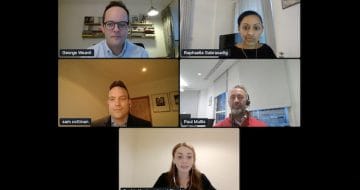Travers Smith partner Stephanie Lee talks billion-dollar disputes, careers advice and life at the firm

“No one day for me is the same as another — so there isn’t a typical day-to-day. That’s probably true of any disputes lawyer, and it’s part of the fun of it,” says a smiling Stephanie Lee, dispute resolution partner at Travers Smith. She does, however, caution against the common misconception of litigators spending all their days in court. “Firstly, more than 90% of cases settle before they get to trial. Secondly, the work I do is quite varied — for example, I am involved in arbitrations, which are before a tribunal rather than court, and investigations, which are internal-facing or regulatory focused. So, being in court can in fact be a rarity,” Lee explains.
Lee’s day, on the client-facing front, generally sees her focusing on the multitude of legal and factual strands and issues impacting her various cases and investigations. “That may be analysing documents, writing letters to the other side’s lawyers, proofing factual witnesses, liaising on expert evidence, or discussing strategy with the client,” she details. Lee points out that the work of a disputes lawyer is, though, very much team-centric, with everyone playing their part, from paralegals to trainees, to junior and senior associates.
“As a partner, I try to give my team as much free rein to do the work as possible, and my role is really to be on hand as a sounding board for particularly tricky issues or strategic matters,” says Lee. And when she isn’t busy tackling disputes, Lee plays a key role in hiring trainees as co-head of graduate recruitment and is also on the steering committee for the firm’s office move in 2026.
When I ask Lee about the most gratifying case she’s worked on so far, she confesses that it would be a struggle to pick just one. “As a disputes lawyer our matters are quite lengthy — we can live and breathe cases for a year or five years or even more. So, you tend to get really into whatever matters you’re doing at any given moment and often find yourself immersed in a whole new world you’ve never come across before,” she explains. Lee gives me the example of a noise nuisance case she worked on for Alton Towers: “I learnt so much about the technicalities of measuring noise levels,” she says, chuckling.
But Lee’s work on the high-profile HP-Autonomy dispute, a $5 billion fraud case, is nothing short of a career standout — so much so it was billed as the ‘tech trial of the century’. “It’s a case that has absolutely everything,” she says. “We were creating new law (using a particular legal provision and structure for the first time), the facts underlying the fraud were absolutely fascinating, and the case culminated in a ten-month trial.” She tells me that she started working on the case shortly after the firm was instructed in 2013, all the way through to the trial six years later. The firm eventually succeeded on the issue of liability for the client, with a quantum trial scheduled for next month. “As a disputes lawyer, you can grow up in the course of a matter — you might start on something as a junior associate and become a partner while working on it, which is what happened to me!”
While on the topic of long-running matters, I was curious to hear from Lee how juniors coming onto a case can get their head around years of developments and equally, how someone who’s been working on such a dispute can stay engaged over such a lengthy time span.
“I always think it must be difficult for trainees being parachuted into a case in the latter stages, both in terms of getting up to speed and feeling part of a team which has been working on it for perhaps the past four or five years,” she tells me. However, Lee explains that she has always been amazed at their capacity to do just that. The crucial thing is to be enthusiastic and engaged and try meaningfully to contribute to the progression of the matter: “If you’re just observing, it’s much harder to take things in. But, if you’re a trainee who’s actually doing meaningful work – and that’s something we ensure that all our trainees in fact do — it’s incredible how quickly you can get to grips with things.”
As far as staying engaged on a matter goes, Lee tells me that even if a dispute or investigation is long-running, the lawyers will be working on a huge variety of issues and matters within that dispute, which keeps things interesting.
“In the early days, you are essentially presented with a puzzle. The client comes to you with the pieces of a jigsaw, and you need to figure out, often from reviewing relevant documents and interviewing key people, how these all fit together. Fast-forward a couple of years, and you’re perhaps engaged in the disclosure exercise and reviewing the other side’s documents, and in this way, adding more pieces to the puzzle but also allowing it to take shape. Then you move into witness statements and expert evidence. All these phases play their part in bringing the whole picture together and are all very different, so really, no one day is the same,” says Lee.
Lee points out that another aspect that makes disputes work so interesting is the fact that there’s an opponent who is strategising and taking steps you might not be able to predict. “What this means is that you’re constantly having to adapt over the lifespan of the matter because your opponent is often disrupting your plans as you put them into action,” she explains.
With this in mind, I ask Lee about the people management side of a contentious practice and how to navigate tense cross-examinations or client emotions running high. “Disputes are very much a people business because you are often seeing clients at their most vulnerable, embroiled in a contentious situation which they would rather not be in. Even though the majority of our clients are companies, we are taking instructions from individuals within those companies who might themselves have skin in the game,” she notes. This means that disputes lawyers have a key role to play for their clients beyond just providing legal support; they also need to be a truly trusted advisor. As for the dynamic with the other side, Lee points out that the common view of litigators as aggressive and hostile is a misconception. “It doesn’t have to be that way, and indeed, it shouldn’t be, in my view. If you’ve got a good case, you don’t need to resort to dirty tactics or inflammatory language. In fact, the whole point of instructing lawyers is to resolve the dispute for our clients — we are not taking on the dispute and making it our own,” she details.
Approaching the end of our conversation, I ask Lee about her experience at the firm, as a Travers Smith ‘lifer’ (she started out at the firm as a trainee in 2008), and her advice for those seeking out training contracts. “I promise that my decision to stay at the firm all my career is not just a product of lack of imagination,” she says, laughing. Lee chalks it up to the firm being a genuinely happy environment and having had great opportunities to build her career within its growing dispute resolution team. “It’s unusual in the market for people to stick around at one firm for so long, but it’s not so unusual to find that at Travers — we have plenty of partners who trained here,” Lee points out.
Lee’s mantra for aspiring trainees is to ask questions, listen, learn, and absorb. “You can’t fake genuine interest and enthusiasm in a firm or practice area and demonstrating that at interviews or events can really make you stand out. You need to immerse yourself in that world for a while and get a true feel for it, whether that’s talking to relevant people, attending events, or even just walking into a courtroom to observe proceedings,” she advises.
Stephanie Lee will be speaking alongside other Travers Smith lawyers at ‘Demystifying disputes and investigations — with Travers Smith’, a virtual student event taking place tomorrow afternoon (Tuesday 9 January). Apply to attend.
About Legal Cheek Careers posts.



